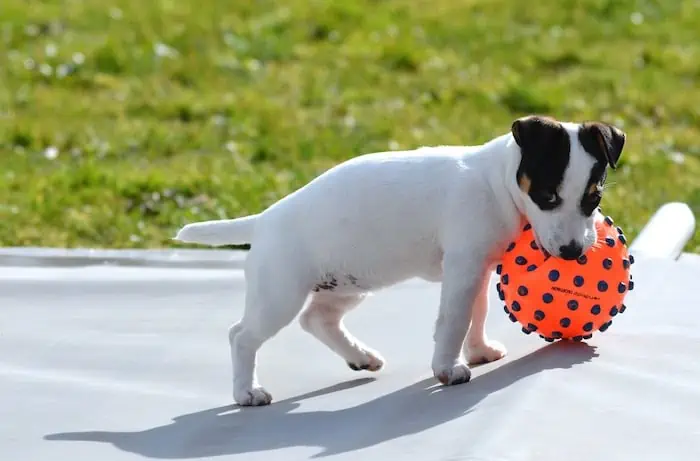Are Jack Russell Terriers Good Family Pets?
Your pup is an integral part of the family. We all know that every dog breed has something distinctive to offer, and they all come with their unique traits and personalities. When we talk about Jack Russell Terriers, they have their pros and cons as well. On a quicker note, though, can Jack Russell Terriers be good family pets?

Yes. Without a doubt, Jack Russell Terriers make excellent family pets. They are devoted and caring canine companions, they work hard to satisfy their owners, and they are loyal companions. Jack Russells are energetic and affectionate dogs with a loving demeanor toward their owners and other household members.
Additionally, they serve well as small guard dogs to keep your family secure at all times and alert you to danger. Jack Russells are incredibly bright canines who know how to get along with people of all ages.
When properly trained and handled, Jack Russells form strong ties with their owners and other family members and make a great addition to the family.
What makes Jack Russell Terriers fantastic family dogs?
Jack Russell Terriers are excellent family dogs for a variety of reasons. Here are a few of them:
- This energetic canine is an excellent family dog, especially if you have children above the age of three or four years old. Their adventurous attitude requires the presence of someone who shares their enthusiasm for the same activities. Jack Russells have a propensity to become bored, so it’s ideal if they live with a family who is willing to devote adequate attention to them.
- There are minimal health and hereditary disorders associated with the Jack Russell Terrier, which is a huge plus contributing to making them good family dogs. They’re believed to be exceptionally tough, and most of their injuries are simply self-inflicted by their rambunctious personalities and desire for fun and adventure. Compared to other smaller dog breeds, they have pretty good health, and this will save you a lot when it comes to vet bills as well as your stress levels.
- Despite their tiny stature, they make excellent security dogs for families since they will not cower in a corner if they perceive a threat. These dogs are brave, fearless, and willing to protect their family and loved ones.
- They are very easy to care for because they are so self-sufficient. As a result, you may raise them with the bare minimum of attendance. However, this does not exclude their need for fun and stimulation.
- The lively and mischievous Jack Russell enjoys moving about, and you’ll be amazed at how quickly they jump and hop from one location to another. Surprisingly, unlike many other dogs, they do not grow out of this behavior as they get older. Jack Russells maintain a high level of activity until old age. However, all of this energy means they are also more likely to pick up on learning new tricks, and this makes them very entertaining to train. They are always up for playing games with you and showing off skills like rolling over, shaking a hand, and doing a high-five with you. This propensity for tricks and enjoyment in interaction is just another reason they are one of the best family dogs.
- They are cost-effective in a way since they eat smaller amounts of food. This will save you a significant amount of money in the long run, but you will still want to invest in acquiring high-quality dog food to keep them healthy and active for as long as possible.
- Jack Russells are highly devoted to their pet parents and will do everything possible for them.
- Jack Russell Terriers also have an active and vibrant temperament that infuses a sense of vitality into the home.
- When compared to other small dog breeds, Jack Russells have a significantly longer lifespan. This is a huge pro as it means you’ll have plenty of years with your canine companion.
- Jack Russells don’t take up much space, so there is no need for additional space or the need for making a lot of changes within a standard home to accommodate their presence.
- Jack Russells are generally low-maintenance dogs when it comes to grooming and helping them look their best. However, no matter what coat type they have (smooth, broken, or rough), they do tend to shed a lot. A good brushing once a week (or as often as necessary) should help keep the shedding at a tolerable level. Their low grooming requirements also contribute to them being good family dogs, as you’ll have more time spent interacting with them instead of more time spent dealing with the hassle of specific grooming needs.
Training your Jack Russell to become a family dog

Training is essential for all Jack Russell Terriers. It is best to start teaching your puppy the ropes of canine life at about 3 to 4 months old.
It is not necessary to attempt to train them to be “great dogs” but rather to educate them to act appropriately since their high energy levels may lead to mischief. The majority of the time, experts propose training them:
- Basic commands
- Proper socialization
- Potty training
- Understanding your position as the head of the household
It is best to socialize your Jack Russell Terrier with other dogs and strangers starting from a young age rather than trying to do so later in life. Due to their high-strung nature and tendency to act like miniature guard dogs, helping your Jack Russell become desensitized to other pets, animals, and humans is essential in making sure they grow up to have a good attitude and can be pleasant around others.
One of the most crucial things you’ll need to do is to teach your children and other family members how to interact with Jack Russell appropriately as well. This will not only prevent the dog from experiencing stress and acting out, but it will also help build a sense of devotion between your Jack Russell and other family members since everyone will be living under the same roof.
The same as with any other breed of dog, you must also inform your Jack Russell that you are the one in charge and that you make all of the decisions in the household and even outside of the home. Once your pup knows this, you will have no trouble controlling your dog.
Overall, there aren’t very many difficult tasks to accomplish when training a Jack Russell compared to other dogs. All that is mainly required is consistency and patience.
How to start training a Jack Russell Terrier: what is the most effective way?

Choosing the most successful technique for training a Jack Russell is a personal decision for each dog owner, each of which will have his or her own set of methods or preferences for getting the task done. However, let’s discuss the best methods for training a Jack Russell, including clicker and non-clicker training protocols.
Clicker Training vs. Non-Clicker Training
Clicker training is a favorite training technique, and it is the one that most experts use when training a Jack Russell as well. This is because this method favors a positive reinforcement-based training strategy for your pets instead of resorting to anything harsh or negative.
Non-clicker training may still be practical when combined with a reward. However, some people use punishment as a training method, and this is something we do not support doing with your canine family member.
With clicker training, you teach your Jack Russell to link the training word with a click that only appears when the desired action is performed. Clicker training is simple: you use treats and simple phrases as well as a “clicker button” to train your Jack Russell Terrier, and they eventually begin to associate the click with positive rewards, allowing the training to become quick and efficient.
You’ll need a few things if you want to use clicker training as your primary training strategy, though:
- A quiet, distraction-free environment
- A clicker
- Small snacks and treats
Tips for raising a Jack Russell Terrier
Jack Russells are energetic and enthusiastic companion dogs who make excellent family pets. As a result of their quirks and personalities, it is vital to pay close attention to critical factors when choosing a Jack Russell and when trying to rear a happy, well-acclimated terrier.
Keep the following suggestions in mind before bringing a JRT into your home:
- When you select a Jack Russell puppy, be sure to have the papers required to register your new pup. It is far more challenging to obtain this documentation once you have left the breeder’s residence.
- Choose the pup that best meets your criteria, taking into consideration your family’s requirements, preferences, and general way of life. You do not want to be home with a pup that clashes greatly with how your home normally flows.
- Before bringing your Jack Russell home, make sure that your home is puppy-proofed. Many ordinary home products can be detrimental or even lethal to your pup if you don’t take the necessary precautions to keep them safe. It’s best to have this completed before getting your pup so you’ll have time to help your new canine adjust to the home upon arrival rather than worry over puppy-proofing with a brand new animal loose in the house.
- Plan ahead of time for the arrival of a new Jack Russel pup, including preparing your children and current pets for the change. Establish rules for your kids on how they should interact with the new puppy. It’s important to remember that existing pets may still require some adjustment period after the new arrival takes place.
- If you are certain that you do not want to breed your Jack Russell, you should strongly consider having your pup spayed or neutered to avoid an undesired litter of pups in the future. This will also help many dogs be calmer and avoid behavioral and health issues, too.
- Establishing the pack hierarchy right away is a key element of Jack Russell’s training. Your pup needs to understand that you are the alpha in the home, as they have very strong personalities and have no problem trying to assert themselves as the dominant force if given the opportunity. Keep in mind that taking a dominant position does not imply frightening or abusing your terrier, so do not treat your dog inhumanely for the sake of trying to assert yourself as the ruler of the home.
- Remember that not all pets will get along with a Jack Russell. All animals commonly found in the outdoors (such as snakes) and anything that seems like it may be considered prey will be targeted by your terrier, including rodents (such as rats, rabbits, and guinea pigs). If you have any of these as pets, it may be worth considering sectioning off a part of the home to keep them separated for safety purposes.
- For Jack Russell, obedience training is vital for his or her safety. All Jack Russells should be familiar with the fundamental commands (sit, lay, stay, and come), and they should be able to perform them consistently in a variety of different situations. Obedience training requires patience and a lot of repetition. This implies that you must be actively involved in your terrier’s training and that you must praise and repeat the commands on a routine basis with treats and positive reinforcement.
- Understand that housetraining your Jack Russell may take longer than housetraining other dogs you may have previously had. It does not mean that they are dumb, they are simply stubborn and prone to doing as they please, so potty training may take 6 to 8 months to finally click for them.
- It is far simpler to prevent undesired behaviors from forming than it is to stop them after they have been taught.
- You may experience some problematic behavioral issues while teaching your Jack Russell Terrier. Maintain your composure, keep your temper under control, and address the problem with a clear mind, lots of patience, and plenty of understanding.
What to avoid when adopting a Jack Russell

It’s possible that by adopting a dog, you may be saving a life—and you will surely be enhancing your own life with love and companionship for many years to come!
Since you’ll be making a life-long commitment, you’ll also want to be certain that you’re taking all of the necessary precautions before bringing your new friend home.
Here are the three most common mistakes individuals make when deciding to adopt a Jack Russell Terrier. Hopefully, knowing ahead of time will prevent you from falling into these traps and will instead help you get your new pet off to a good start.
See Also: Should I Visit My Dog After Rehoming? (3 Reasons)
When adopting a Jack Russell, you must avoid these three things:
Jumping into it
Jack Russells are difficult to resist, and obtaining one can be such an exhilarating experience that some people make the mistake of jumping headfirst into Jack Russell ownership when they aren’t quite ready for it.

You should give significant consideration to whether or not you are at the correct stage of your life to have a Jack Russell Terrier as a companion. While you may be tempted to adopt one of these adorable pups, you’ll need to determine if you can fully afford the supplies and food it will need as well as the veterinary care required and whether your lifestyle allows you to devote all the time your terrier will need for exercise and attention.
Only having eyes for Jack Russell puppies
Puppies are, without a doubt, cute. Who wouldn’t be enticed to welcome a precious, joyful little bundle of fur into their homes? Nevertheless, they require a significant amount of labor. The process of training and socializing them is time-consuming, and you should anticipate some spills and chewed-up objects along the way.
Don’t make the mistake of passing on a senior Jack Russell Terrier that needs a home. These adorably devoted canines have a lot to give. They’ve already been trained most of the time, and those more advanced in age are usually more laid-back than their younger counterparts
Not conducting proper research on the breed

Watch the footage and informational bits on these lovely dogs online before adopting! Find out if a Jack Russell is best suited for you and your family. You’ll also need to consider if anyone in your family suffers from canine allergies before getting a Jack Russell or nearly any other breed of dog, too.
After becoming more educated on the breed itself, research each organization’s and shelter’s rules and application procedures to ensure that you don’t miss out on a dog that you fell in love with during a potential adoption visit.
Related Questions
Do Jack Russells get along well with children?
Yes, they do. They are very gentle with children and often have a positive demeanor. You may have heard that Jack Russells are not good dogs for households with little children, but that is not entirely correct.
The essential component in ensuring a Jack Russell works well in a home with children is the fact that you must adequately train your Jack Russell first. After proper training, you should expect to have a kind dog with a loving heart and a gentle temperament. A Jack Russell without proper training will try to just dominate the household and likely have an unpleasant attitude.
We are well aware that Jack Russells come from a predatory lineage. As a result, they might not be the finest dog breed to nurture children under the age of three. If you intend to do so, you must keep a watch on both the child and the dog at all times.
Most essentially, you must also educate your children on properly approaching a dog—both your new Jack Russell and any other dogs they may come across in life. Additionally, make it clear to your Jack Russell that they must respect the other household members aside from just you. Because of Jack Russell’s great intellect, they should be able to adjust to your living arrangements in any case with the proper instruction.
Related Reading: 9 Reasons Why My Jack Russell Follows Me Everywhere

Family Dog Expert Author
Hi there! I’m Stuart, a devoted dog lover and family dog expert with over a decade of experience working with our furry companions. My passion for dogs drives me to share my knowledge and expertise, helping families build strong, loving bonds with their four-legged friends. When I’m not writing for SirDoggie, you’ll find me hiking, playing with my beautiful dog, or studying music.